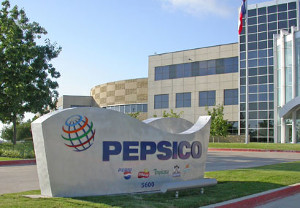 essive work experience on his resume, Brian Cornell’s most important attribute may be what he doesn’t have: a career at Target Corp.
essive work experience on his resume, Brian Cornell’s most important attribute may be what he doesn’t have: a career at Target Corp.When the PepsiCo Inc. executive takes over as the retailer’s next chief in two weeks, becoming the first outsider to ever lead it, he’ll have to shake up a cautious, bureaucratic culture in order to address challenges including e-commerce rivals and the grinding decline of the big-box store format.
That should be easier to do without the baggage of years inside the retailer he’s trying to shake up. Cornell, 55, has in the past three decades worked for at least six different companies as diverse as warehouse clubs and orange-juice makers. By contrast, his Target predecessor Gregg Steinhafel had spent 35 years at the company.
“There is clearly an advantage in bringing in an outsider for the organization to bring some fresher perspective to Target,” Arun Daniel, a senior fund manager at J O Hambro Capital Management in Boston, said in a phone interview. “There is no overnight fix for Target.”
Companies that have turned to outsiders have had mixed results in the recent past. Ford Motor Co. managed to avoid the bankruptcies and bailouts that befell its competitors after hiring Alan Mulally away from Boeing Co. The executive led the automaker to $42.3 billion in profit in the last five years before he stepped down last month.
Meanwhile, Ron Johnson attempted a transformation of J.C. Penney Co. that ended in disaster, shrinking the company’s sales back to where they were in the 1980s, after the department-store chain hired him from Apple Inc.
Consumer Goods
While he’s new to Minneapolis-based Target, Cornell has spent 30 years working for consumer-goods makers and the companies that sell them. His early positions were at Seagram Co. and then Tropicana and PepsiCo. In 2004, he moved over to retail, working as chief marketing officer for Safeway Inc. before becoming CEO of craft-goods seller Michaels Stores Inc. and then hopping to Wal-Mart Stores Inc. to run its Sam’s Club warehouse unit.
There he strengthened bonds with suppliers and instituted a digital couponing program that helped results, David Strasser, an analyst Janney Capital Markets in New York, said in a note yesterday. Most importantly, sales rose 15 percent to during his tenure, outpacing the company’s overall 11 percent gain.
“Although Mr. Cornell was not at Wal-Mart for a long time, during that period, we did get to know him and were impressed with where he was taking the division,” Strasser said. “During that period of time, Sam’s Club showed improvement.”
Canadian Losses
Cornell, who’ll also become chairman, will have plenty to improve upon at Target. Aside from fixing its Canadian operations, which lost $211 million before interest and taxes in the first quarter, he’ll have to get its brick-and-mortar and online operations more in sync.
That could be a challenge for him, since it’s one area he hasn’t worked in much, Brian Yarbrough, an analyst with Edward Jones & Co. in St. Louis, said in an e-mail.
“He has a lot of good experience at other large retailers as well as consumer products,” Yarbrough said. “He understands the value of brands and how to communicate the brand to consumers. The one weak link could be the lack of omnichannel retail experience but he can always bring in strong people beneath him to fill that role.”
Yarbrough recommends buying Target’s shares, which rose 0.1 percent to $59.67 at 11:43 a.m. in New York.
Exclusive Merchandise
Another main challenge will be finding out how Target fits in a world where smaller retailers and online sellers are making big-box stores obsolete. One way may be by reinvigorating its practice of striking exclusive deals for cool merchandise that shoppers can’t get anywhere else.
The problems may require bold solutions, something Target hasn’t been known for recently. Even before Target’s holiday data breach, which exposed the personal information of tens of millions of customers, the retailer had lost its way by becoming too cautious and bureaucratic, Interim CEO John Mulligan, also the company’s chief financial officer, said in an interview in May.
Since Mulligan took over, he hired a top data-security executive, replaced the retailer’s Canadian chief and moved the company’s entire leadership team to the 26th floor of its headquarters to allow faster decisions and more clarity.
Target also started scaling back on its four governance meetings, which have focused on the supply chain, marketing, design and capital expenditures.
Personally Responsible
Steinhafel held himself personally responsible for the security attack. About 40 million credit- and debit-card numbers, along with 70 million addresses, phone numbers and other pieces of information, were captured by the malware attack on the company’s 1,797-store network during November and December.
Target’s profit has fallen for six straight quarters, also hurt by weaker demand from American consumers who have remained cautious about spending during the economy’s shaky recovery.
While those lower earnings may become the company’s baseline, Cornell’s presence and early moves may be able to boost the stock, Faye Landes, an analyst at Cowen & Co. in New York, said yesterday in a note upgrading the stock to the equivalent of a hold from a sell.
“He is an excellent presenter,” Landes said, “and is likely to rapidly give the impression that he has the situation at Target under control.”
As for the company’ he’s leaving, Cornell’s two-and-a-half- year tenure at PepsiCo didn’t give him enough time to make sweeping changes and leave a gaping management hole, said Ali Dibadj, a New York-based analyst at Sanford C. Bernstein & Co.
“PepsiCo has a very strong bench,” Dibadj said.





